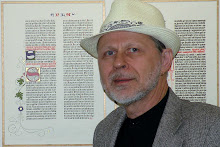10 November 2011
It’s NaNoWriMo month and I’ve been busy writing the prequel to For Blood or Money, titled For Toil and Trouble. You can read along chapter by chapter as I write it if you don’t mind a few stumbles and inconsistencies.
While writing is taking a lot of time, I decided that this was also the perfect opportunity to do a revised second edition of For Blood or Money. Let’s face it, I’ve learned a lot about both writing and publishing since I released that book in 2008! Normally, I’m not a proponent of revising a published work unless substantive facts change, as in a non-fiction work. Revising a work of fiction implies that it wasn’t ready to be published the first time. But, I’ve been bugged by two “flaws” in the book that I really wanted to fix. One was the fact that my narrator shifts tense from past to present in the book. The second is the use of the pronoun “you” when narrating. I felt there were some real problems here.
So, I moved the book to a new more readable layout, and then started “proofreading” it for these errors. Some places I just had to change a word and all was well, and others I had to rewrite an entire paragraph. By chapter three, I’d made a bucketload of changes and I was beginning to doubt whether I was taking the right approach.
In writing For Toil and Trouble this month, I discovered I was encountering some of the same issues. I had to think this through more carefully.
Shifting Tense.
According to Ask Dr. Pretentious there are no less than 12 different tenses in the English language. (http://dr-pretentious.livejournal.com/23750.html?thread=144838#t144838) The simple past, present, and future most of us grasp. But adding progressive, perfect, and perfect progressive modifiers to each is a little more complex. I was having (past progressive) difficulty just separating past and present.
A bad example of shifting is also a colloquial use that I’ve heard frequently. “He shouted an insult at me and then he just leaves.” Both events described in the sentence happened in the past, but the second action was written as though in the present. I want to correct those.
An example that I’ve decided not to correct distinguishes past action from present state of being. For example: “I walked to Jitters this morning and ordered my usual decaf quad grande Americano. I like my coffee hot, strong, and black.” In this instance, the past tense verbs indicate an action that happened earlier. The present tense verb indicates a continuing state of being. As long as I have not stopped liking black coffee, it should be present tense. “I ran to the intersection and looked both ways. The streets of Seattle are laid out along a perfect grid.” The first sentence indicates a past action, the second (aside from being a false statement) expresses a continuing state of being. As long as the streets haven’t changed, the construction is correct.
Now to go back and correct the things I previously incorrectly corrected!
Breaking the Third Wall
This is a common occurrence in daily speech. We use the pronoun “you” as a universal substitute for the pronoun “one.” For example:
Dag: “Imagine your husband is cheating on you.”
Jen: “I’m not married.”
Dag: “Imagine a woman whose husband is cheating on her.”
Dag’s personalization of the hypothetical experience backfired on him. In the same way, if I use the pronoun “you” in my writing, I stop telling a story and attempt to personalize it by addressing the reader. That, except in rare occurrences, will also backfire. I did this a lot in For Blood or Money, and realized that it most frequently shows up in first person narratives. It is not unheard of in third person narratives, however. “He examined the contents of the bag and pulled out a pocket knife, a role of duct tape, and a ball of string. Then he reached for one more thing. You never know when chewing gum might come in handy.” In the last sentence, I stopped telling a story and gave an aside to the reader. (I also switched tense!) That the kind of thing is what I need to correct in both books.
If you have experience in either of these or an opinion about encountering tense shift or wall breaking in the books you read, I’d appreciate your comments.
Now, back to editing and writing!

1 comments:
We all know Amazon is large but prepare to be shocked. It’s hard to seek out something that Amazon doesn’t sell. you’ll find everything from a shocking Jeff Goldblum curtain to entire houses with free two-day shipping. (No, I’m not making that up.)
The only thing better than shopping on Amazon? Getting what you would like for free of charge . Get Free Amazon Gift Cards
Post a Comment